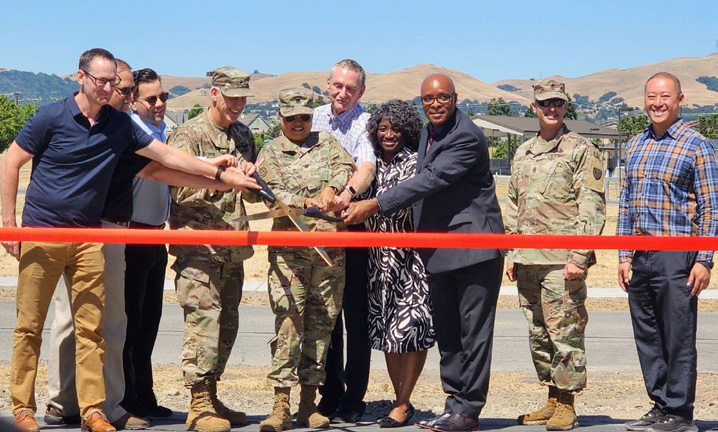
Author’s Note: Since our article’s submission to America’s Engineers 2023, TechFlow has received the DIU’s sole success memo for EV charging infrastructure, enabling us to install self-sustaining solutions at over 800 U.S. locations.
When President Joe Biden signed a 2022 Executive Order committing the U.S. government to achieve net-zero emissions by 2050, the Department of Defense (DoD) followed suit by announcing the agency’s plans to transition its entire non-tactical fleet to electric vehicles (EVs) by 2035.
The U.S. Department of Defense has a massive fleet of over 170,000- vehicles classified as non-tactical, ranging in size from sedans to buses, and only a tiny fraction are EVs today.
To meet its 2035 deadline and secure the long-term success of EV adoption in the U.S. military, the DoD must quickly develop state-of-the-art charging infrastructure specifically tailored to the distinctive requirements and massive scale of its upcoming EV fleet.
DIU Chooses TechFlow to Drive Innovation in DoD EV Charging Solutions
The DoD’s Defense Innovation Unit (DIU) took on the task of selecting private industry partners to develop and deploy modern EV charging technologies and infrastructure at eight military bases. Technical and cybersecurity experts from multiple branches of the DoD conducted thorough reviews of the 44 proposals received.
To revolutionize its private-public pilot project, the DIU sought a partner with expertise in navigating complexities with federal agencies, addressing unique DoD use cases, meeting the U.S. military’s large-scale infrastructure needs, and delivering rapid development.
In October 2022, the DIU selected TechFlow, a San Diego-based 100% employee-owned company with nearly 30 years of DoD partnership, deep and broad expertise in renewable energy and mobility solutions, a history of successful innovative collaboration with the federal government, and a customer-focused reputation.
Data-Driven Insights: Pilot Study Paving the Way for Enhanced DoD Charging Solutions
The TechFlow/DIU pilot projects initially being deployed at Navy, Marine, Air Force, and Army Reserve sites allow key personnel to closely monitor and assess critical data, including usage, uptime, vehicle types, wait times, and mean time to repair equipment. TechFlow’s long-standing history of partnering with the DoD, coupled with its expertise in renewable energy and mobility solutions, will enable engineers to measure the most critical aspects of the solution to optimize performance. These insights will help TechFlow and the U.S. military gain deeper insights into how to improve EV charging infrastructure in preparation for the mass deployment of solutions to support the DoD’s EV fleet of the future. The pilot study highlights the importance of measuring individual fleet requirements, geographical energy challenges, projected utilization, and mission-specific factors. The data gathered will help engineers swiftly and confidently design tailored EV charging solutions for each DoD site. Additionally, the study tests and improves policies and procedures to support the upcoming widespread adoption of EV charging.
Lessons Learned: TechFlow Experts Share Key Considerations for the DoD’s Future EV Charging Needs
Site Selection: Deliberate consideration of EV charging infrastructure placement at DoD installations is essential. Engineers should thoroughly evaluate factors such as traffic flow, vehicle sizes, turn radiuses, future expansion space, vehicle staging areas, maneuverability, traffic safety, ADA compliance, and power proximity to ensure safe and efficient charging without impacting operations.
Personal Vehicle Charging: As EV adoption grows among consumers, workplace charging is becoming essential, particularly for the U.S. government, with its large civilian workforce of over 2 million employees. However, charging personally owned vehicles (POVs) using government assets presents challenges. The
government cannot provide charging as a gift or generate profits from charging fees. Instead, all payments for POV charging sessions must be sent to the U.S. Treasury, leaving little hope for facility maintenance and energy cost coverage.
TechFlow’s first pilot study EV charger installation offers a solution to this issue. It can charge both government-owned vehicles and POVs in compliance with regulations, addressing a major challenge in EV charging solutions at DoD installations.

Cybersecurity: A secure network architecture is essential to protecting EV charging stations at DoD installations. Separating the charging station network from critical enterprise networks mitigates attack risks. Implementing firewalls, intrusion detection, prevention systems, and network segmentation strengthens network security.
TechFlow’s secure solution ensures reliable communication and control of the EV charging network without connecting to the DoD’s enterprise network, enabling real-time monitoring and communication while exceeding cybersecurity requirements for operational and transactional data.
Policies and Procedures: Enhancing mission readiness and operational support is crucial for DoD facilities. Strategic prioritization policies for charging access during limited electricity or high-demand periods can optimize energy allocation. TechFlow’s solutions undergo rigorous mission impact assessments for readiness optimization.
Additionally, integrating EV charging with fleet management systems aligns energy needs with mission requirements, optimizing schedules and energy usage. A charging scheduling protocol ensures grid stability, preventing vehicle blockage at stations, controlling demand spikes, and enhancing operational flexibility for efficient energy management.
Uptime and Energy Availability: Ensuring uninterrupted EV charger uptime on military installations is vital for the DoD’s operational readiness. Downtime hinders
charging and mission readiness, impacting mission-critical vehicles. Robust electrical infrastructure and distributed power generation are necessary to meet the growing EV fleet’s demands. TechFlow’s solutions prioritize uptime and electricity availability, supporting vehicle readiness, mission requirements, and sustainability goals, which ensures reliable charging operations for the DoD’s EV fleet.
Energy Resiliency: Integrating EV charging with distributed energy resources, smart grids, and microgrids optimizes energy use, enabling dynamic load management and adjusting charging demand based on grid conditions. Prioritizing critical loads and efficient resource utilization enhances sustainability and charging operation efficiency. TechFlow’s agile EV charging facility design ensures scalability, saving time, money, and resources. Diverse energy sources, including renewables and conventional grid power, fortify resiliency by ensuring a reliable energy supply for EV charging. Energy storage systems provide backup power during outages and support renewable energy use, promoting efficient and sustainable charging operations.
TechFlow Elevates EV Charging Innovation: Secures Key Success Memo to Scale Production
TechFlow has advanced its innovative EV charging projects for the DoD to a new level, moving past the trial phase. A success memo, recently granted by the DIU, propels TechFlow from innovative trials to full-scale operational readiness, gearing up to meet the DoD’s ambitious target to electrify its non-tactical fleet by 2035. TechFlow has secured the green light to initiate production contracts and commence the nationwide deployment of its state-of-the-art EV charging infrastructure. With nearly three decades of experience developing sophisticated solutions for the DoD, TechFlow stands ready to cater to the evolving electrification needs of America’s defense with unparalleled expertise and a robust, renewable energy-driven vision.
This article originally appeared in America’s Engineers on December 6, 2023. Click here to check out the magazine for free, and click here to read TechFlow’s article on page 76.



